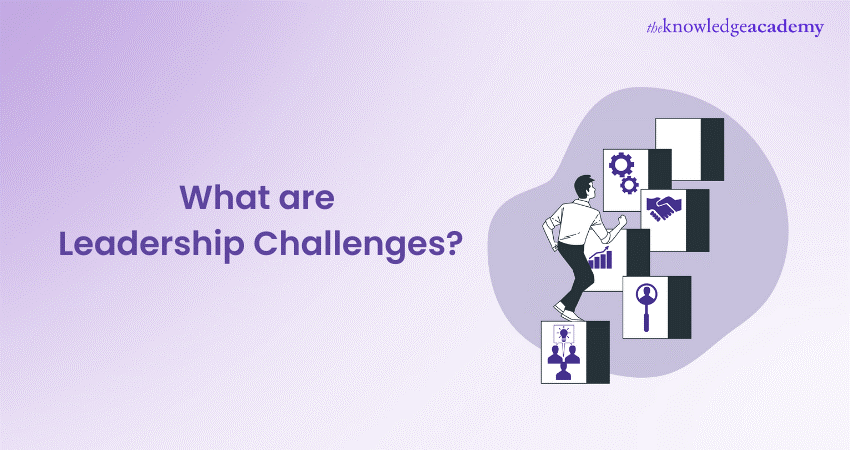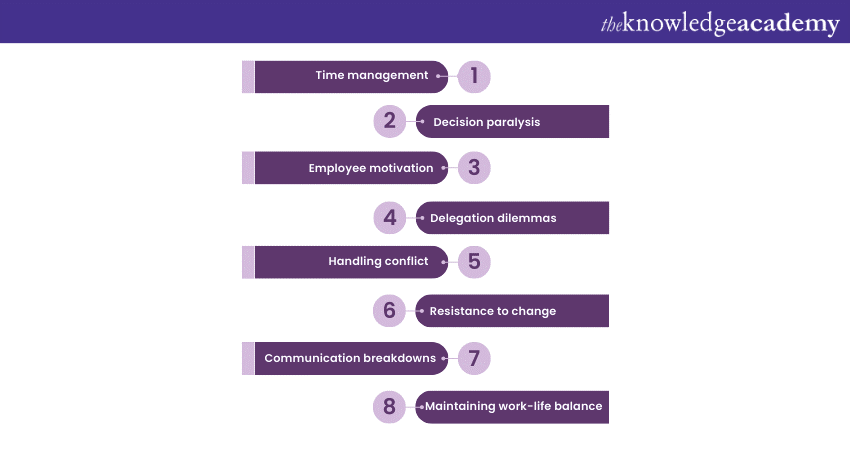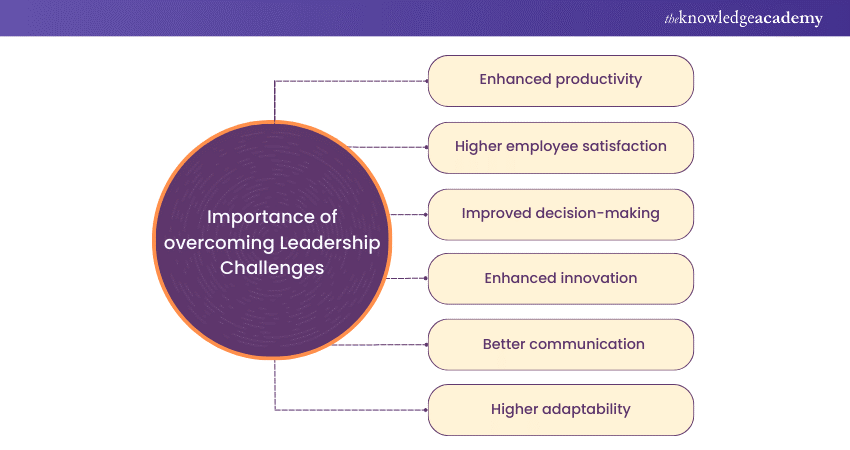We may not have the course you’re looking for. If you enquire or give us a call on 01344203999 and speak to our training experts, we may still be able to help with your training requirements.
Training Outcomes Within Your Budget!
We ensure quality, budget-alignment, and timely delivery by our expert instructors.

Navigating through challenges is an integral part of a leader’s journey towards success. Braving Leadership Challenges isn’t just a prerequisite for a competent leader, but a necessity for streamlining an organisation’s operations. Aspiring and seasoned leaders alike must be equipped with the right strategies to tackle hurdles effectively.
By implementing these essential strategies, leaders can create a thriving work environment, empower their teams, and drive their organisations towards greater achievements. This blog on Leadership Challenges will offer solutions to navigate the ever evolving professional landscape.
Table of Contents
1) Understanding What are Leadership Challenges
a) Time management
b) Decision paralysis
c) Employee motivation
d) Delegation dilemmas
e) Handling conflict
f) Resistance to change
g) Communication breakdowns
h) Maintaining work-life balance
i) Crisis management
j) Feedback and recognition
2) Importance of overcoming Leadership Challenges
3) Conclusion
Understanding What are Leadership Challenges
Numerous Leadership Challenges can arise out of nowhere and can test even the strongest leaders. These hurdles encompass a broad range of issues that leaders often encounter throughout their journeys, and recognising them is the first step in finding effective solutions. Understanding and addressing these common Leadership Challenges is essential for fostering personal and organisational growth. So, let’s have a brief look at some of them:

a) Time management
Time, a finite resource, poses a challenge for leaders immersed in the complex landscape of responsibilities, meetings, and tasks. The multifaceted demands on leaders' schedules can culminate in time constraints and overwhelming pressure. Influential leaders must adeptly prioritise and allocate their time, fostering productivity while mitigating the risk of burnout. Developing a strategic approach to time management involves discerning between urgent and important tasks, delegating responsibilities where feasible, and leveraging technology for efficiency.
Clear priorities enable leaders to focus on pivotal initiatives, driving organisational success. Additionally, cultivating effective communication skills aids in streamlining interactions and reducing time-consuming misunderstandings. Proactive scheduling, periodic evaluations, and continuous refinement of time management strategies empower leaders to navigate the intricate web of demands, ensuring sustained effectiveness and personal well-being.
b) Decision paralysis
Leaders are responsible for making critical decisions that influence their teams and organisations substantially. Despite the gravity of these decisions, leaders often grapple with decision paralysis – debilitating indecisiveness stemming from the fear of making incorrect choices. Conquering decision paralysis demands a blend of self-confidence, a profound trust in one's capabilities, and an openness to learning from triumphs and setbacks.
Leaders must cultivate a resilient mindset that acknowledges the inherent complexity of decision-making. Leaders can transform decision-making into a dynamic continuous improvement process by embracing the inevitability of occasional missteps. Moreover, seeking input from diverse perspectives, fostering a collaborative decision-making environment, and leveraging past experiences contribute to informed and confident decision-making.
c) Employee motivation
Leaders continuously grapple with the persistent challenge of sustaining high levels of employee motivation. Recognising the inherent diversity in team members' aspirations and needs, leaders must navigate the complexity of understanding and addressing individual motivators. This multifaceted task requires leaders to assume the role of motivational coaches, adept at identifying personalised strategies to inspire and empower each team member.
By fostering an environment that encourages personal and professional growth, leaders contribute to unlocking the full potential of their teams. This approach involves cultivating a deep understanding of team members' goals, providing meaningful feedback, and aligning organisational objectives with individual aspirations. Through this motivational coaching, leaders not only enhance employee engagement but also foster a culture of continuous improvement, contributing to the overall success and well-being of the team.
d) Delegation dilemmas
Navigating conflicts within a group is an unavoidable aspect of team dynamics, demanding adept leadership. Leaders must possess the skills to effectively manage and resolve disputes among team members. This involves impartially mediating conflicts, actively listening to all parties involved, and facilitating a resolution identifying common ground. The critical role of leaders extends beyond conflict resolution; they must also actively promote team cohesion.
By fostering an environment where differences are acknowledged, addressed, and transformed into opportunities for growth, leaders contribute to maintaining a positive and collaborative work atmosphere. This multifaceted approach to conflict management enhances team dynamics, encourages open communication, and reinforces the unity necessary for achieving collective goals.
e) Handling conflict
Navigating conflicts within a group is an unavoidable aspect of team dynamics, demanding adept leadership. Leaders must possess the skills to effectively manage and resolve disputes among team members. This involves impartially mediating conflicts, actively listening to all parties involved, and facilitating a resolution identifying common ground. The critical role of leaders extends beyond conflict resolution; they must also actively promote team cohesion.
By fostering an environment where differences are acknowledged, addressed, and transformed into opportunities for growth, leaders contribute to maintaining a positive and collaborative work atmosphere. This multifaceted approach to conflict management enhances team dynamics, encourages open communication, and reinforces the unity necessary for achieving collective goals.
f) Resistance to change
Implementing novel strategies, processes, or organisational changes frequently encounters resistance from team members, posing a challenge for leaders. Effectively addressing this resistance requires leaders to communicate the advantages of change. Leaders must articulate the positive impact on the team and the organisation. Additionally, providing ample support is crucial for helping teams navigate the transition and fostering a willingness to embrace new working methods. Support mechanisms can include training programs, resources, and a platform for open dialogue.
Leaders play a pivotal role in guiding their teams through change, emphasising the benefits, and creating an environment where adaptability is encouraged. By proactively managing resistance, leaders contribute to a smoother transition, cultivate a culture of flexibility, and ultimately drive the successful implementation of new strategies within the organisation.
g) Communication breakdowns
Effective communication is paramount for leadership success, as miscommunication or inadequate communication can result in misunderstandings, delays, and conflicts within a team. Leaders face the significant challenge of prioritising and fostering transparent information flow. Creating an environment where all team members feel heard and understood is essential. Overcoming this challenge requires communication strategies that facilitate clarity, openness, and active listening.
Leaders should encourage feedback mechanisms, use various communication channels, and consistently reinforce critical messages. By addressing communication challenges head-on, leaders can establish a culture of effective communication that enhances collaboration, minimises errors, and strengthens team dynamics. This proactive approach contributes to improved overall team performance and organisational success.
h) Maintaining work-life balance
Leaders frequently grapple with the delicate task of harmonising their professional commitments with personal well-being. The weighty responsibilities of leadership can become overwhelming, and overlooking self-care jeopardises both resilience and efficacy. Establishing a healthy work-life equilibrium is critical for prolonged success and overall well-being.
Striking this balance fortifies a leader's endurance in navigating challenges and augments their effectiveness in steering their teams and organisations toward shared objectives. Recognising that personal well-being directly influences professional performance, leaders prioritising self-care fortify their foundation and set a precedent for fostering a healthier and more sustainable work environment.
Crisis management
The COVID-19 pandemic stands out as a paramount crisis, testing global leadership and unveiling unforeseen business vulnerabilities. Businesses were compelled to adapt swiftly to survive in their respective industries. Under CEO Tim Cook's proactive leadership, Apple candidly communicated the pandemic's impact, ensuring continuity in product innovation despite challenges like the microchip shortage. The company's commitment to employee safety by enabling remote work fostered a sense of security and respect.
Effective crisis management demands leaders to be optimistic, honest, and realistic while maintaining composure. Acknowledging vulnerability humanises leaders, strikes a crucial balance between making rational decisions and managing personal stress, and defines the resilience of effective leaders during challenging times.
Feedback and recognition
Leadership effectiveness hinges on trust and feedback, with recognition relying on the latter to identify commendable contributions. Addressing the prevalent challenge of feedback gaps, especially in companies grappling with employee engagement, involves utilising the 360-degree feedback process. This approach incorporates insights from supervisors, peers, and customers. Widening the feedback sources enhances leaders' understanding, aiding in team building, compensation planning, training, and rewards.
Over 85% of Fortune 500 companies, including tech giants like Google and financial institutions like Barclays and Goldman Sachs, embrace 360-degree feedback for comprehensive insights, fostering innovation and growth. This approach is particularly beneficial for managing hybrid and remote work scenarios, ensuring consistent feedback and clear expectations through a centralised performance management system.
Enhance your Leadership skills with our Leadership and Management Course today!
Importance of overcoming Leadership Challenges
Leadership Challenges are not merely obstacles to be avoided; they are valuable opportunities for growth and development. Effective leaders understand that these challenges are an inherent part of their roles and embrace them as catalysts for positive change. Overcoming Leadership Challenges is of paramount importance, and here's why:

Enhanced productivity
Successful leadership hinges on motivating and guiding teams towards achieving shared goals. Leaders can create a more supportive and efficient work environment by addressing and overcoming challenges. Team members are inspired to follow suit when leaders navigate challenges with confidence and resilience. It leads to enhanced productivity and better overall performance.
Higher employee satisfaction
Leadership Challenges can have a huge impact on employee morale and job satisfaction. Leaders actively tackling these hurdles fosters a work culture that values employee well-being and growth. Employees are more likely to feel appreciated, supported, and engaged, leading to enhanced job satisfaction and a reduced risk of burnout or turnover.
Improved decision-making
Leaders who learn to overcome decision paralysis and make informed choices set a powerful example for their teams. Sound decision-making inspires confidence and trust among team members. It is because they are likely to follow and respect leaders with a proven track record of handling challenges adeptly. Moreover, better decision-making leads to more effective strategies and outcomes for the organisation.
Enhanced innovation
Addressing challenges encourages creative problem-solving and out-of-the-box thinking. When leaders embrace the unknown and seek innovative solutions, it sets the stage for a culture of innovation within the entire organisation. This mindset can drive continuous improvement and a willingness to explore new possibilities.
Better communication
Effective leadership entails clear and transparent communication. By proactively tackling communication breakdowns and fostering an open and inclusive communication culture, leaders build trust and understanding within their teams. This paves the way for smoother collaboration, reduced conflicts, and an overall healthier work environment.
Higher adaptability
Adaptability is crucial for an organisation's survival in today's fast-paced and rapidly evolving market. Leaders who embrace challenges head-on and encourage adaptability within their teams position their organisations on top. They also stay competitive and relevant in dynamic markets.
Overcoming challenges to Leadership requires Emotional Intelligence, self-awareness and a willingness to learn from successes as well as failures. Leaders who view challenges as opportunities for growth can inspire their teams to view obstacles through the same lens. This shared perspective creates a resilient and agile organisation capable of navigating challenges with a unified front.
Master the art of people management – join now for our Successful People Management and Team Leadership Course and elevate your Leadership skills!
Conclusion
Leadership Challenges are inevitable, but with the right strategies, they can be transformed into opportunities for growth and success. Effective communication, strong team building, adaptability, confident decision-making, conflict resolution, and Emotional Intelligence are essential traits for overcoming challenges and thriving as a leader.
Unlock your Leadership potential with our comprehensive Leadership Training – join now for a transformative learning journey!
Frequently Asked Questions

Leaders today grapple with challenges such as effective communication, navigating change, and maintaining team motivation. Balancing innovation with stability, fostering adaptability, and addressing the diverse needs of remote and hybrid workforces are also prevalent challenges that successful leaders must navigate for business success.

Yes, Leadership Challenges can indeed be turned into opportunities for professional growth. Facing and overcoming challenges cultivates resilience, adaptability, and problem-solving skills. It provides leaders with valuable experiences that contribute to their development, enabling them to emerge stronger and more skilled.

The Knowledge Academy takes global learning to new heights, offering over 30,000 online courses across 490+ locations in 220 countries. This expansive reach ensures accessibility and convenience for learners worldwide.
Alongside our diverse Online Course Catalogue, encompassing 17 major categories, we go the extra mile by providing a plethora of free educational Online Resources like News updates, Blogs, videos, webinars, and interview questions. Tailoring learning experiences further, professionals can maximise value with customisable Course Bundles of TKA.

The Knowledge Academy’s Knowledge Pass, a prepaid voucher, adds another layer of flexibility, allowing course bookings over a 12-month period. Join us on a journey where education knows no bounds.

The Knowledge Academy offers various Leadership Courses, including Leadership Skills and Agile Leadership Trainings. These courses cater to different skill levels, providing comprehensive insights into Organisational Leadership.
Our Business Skills blogs covers a range of topics related to leadership skills and upskilling, offering valuable resources, best practices, and industry insights. Whether you are a beginner or looking to advance your Leadership skills, The Knowledge Academy's diverse courses and informative blogs have you covered.
Upcoming Business Skills Resources Batches & Dates
Date
 Successful People Management and Team Leadership
Successful People Management and Team Leadership
Fri 7th Jun 2024
Fri 2nd Aug 2024
Fri 4th Oct 2024
Fri 6th Dec 2024







 Top Rated Course
Top Rated Course



 If you wish to make any changes to your course, please
If you wish to make any changes to your course, please


